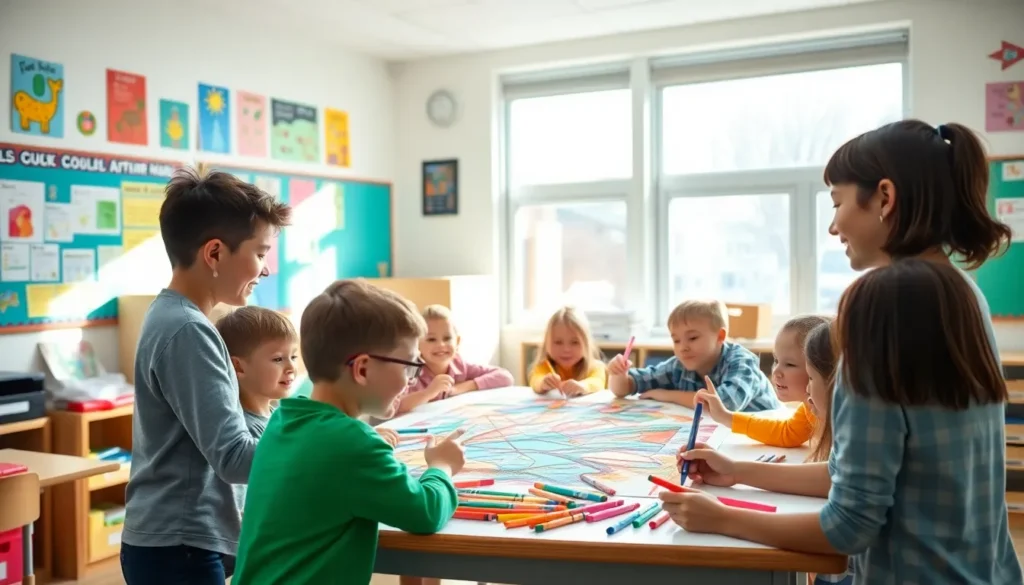Ah, the elementary years. Those chaotic yet charming days filled with crayons, finger painting, and the occasional epic meltdown. They lay the groundwork for everything that follows, from reading intricate novels to tackling the complexities of algebra. Picture it: a time when learning is as fun as riding a rollercoaster, except you don’t have to scream if you want to, though some kids inevitably do. In this text, we’ll investigate into the importance of these foundational years, exploring developmental milestones and learning strategies that mold bright minds into future scholars.
Table of Contents
ToggleUnderstanding the Elementary Years

Importance of Early Education
The significance of early education cannot be overstated. During the elementary years, children undergo incredible transformations that shape their future. Research shows that a strong foundation in education during these early years leads to better academic performance later on. Kids are like sponges, absorbing knowledge and experiences around them. They develop essential skills that apply not only in classrooms but in life overall.
Cognitive Development Milestones
Around ages 5 to 12, children experience a surge in cognitive development. They learn to think critically, solve problems, and understand abstract concepts. These milestones, such as mastering the basics of reading and writing, lay the groundwork for complex subjects in middle school. Grasping these skills early is crucial, as they make it easier to learn more advanced material later.
Social and Emotional Growth
The elementary years aren’t just about academics. These are critical times for social and emotional development too. Children learn how to work in teams, make friends, and navigate conflicts. The lessons they learn about empathy, cooperation, and resilience will influence how they interact with others throughout their lives. By creating a safe and nurturing environment, caregivers can help foster these important skills.
Key Subjects and Learning Strategies
Literacy and Language Development
Literacy is at the heart of elementary education. Children are not just learning to read: they are learning to understand and communicate effectively. Engaging them with diverse reading materials can ignite a lasting love for books. Activities like storytelling, reading aloud, and writing exercises can considerably sharpen their literacy skills and enhance their vocabulary.
Mathematics Skills and Concepts
In math, elementary students begin to grasp concepts such as addition, subtraction, multiplication, and division. Making math fun through games and hands-on activities can encourage a positive attitude towards learning this often-dreaded subject. When students see the real-world applications of mathematics, they are more likely to stay engaged.
Science and Exploration
Science education encourages curiosity and exploration. Allowing children to ask questions and conduct simple experiments promotes a love for learning and discovery. Whether they’re learning basic biology or the laws of physics, hands-on activities can turn abstract concepts into tangible experiences. This way, students discover the joy of inquiry.
Building a Positive Learning Environment
Role of Parents and Caregivers
Parents and caregivers play an essential role in fostering a positive learning environment. Taking an active interest in children’s education, like helping with assignments or attending school events, creates a supportive framework that encourages learning. Even simple conversations about what they learned at school can reinforce the importance of education.
Community and School Involvement
Schools that engage with their communities often see a boost in student morale and performance. Strong relationships between schools and local organizations can open doors for unique learning opportunities. Parents should advocate for school programs that encourage community participation, as these experiences can greatly enrich children’s education.
Educational Technology in Elementary Education
Integrating technology in the classroom can enhance elementary education, making learning more engaging and interactive. From educational apps to interactive whiteboards, technology captivates young minds. Using these tools responsibly can prepare students for a tech-driven future, helping them develop skills they’ll need down the line.
Challenges Faced During the Elementary Years
Navigating Learning Disabilities
Not all children progress at the same pace. Some may face learning disabilities that can hinder their academic progress. It’s crucial for parents and educators to identify these issues early and collaborate with specialists. With the right interventions and support, children can develop strategies to overcome challenges and find success in their learning journeys.
Addressing Social Issues and Bullying
Social dynamics can also prove challenging. Bullying, peer pressure, and exclusion can affect a child’s self-esteem and academic performance. Schools must establish anti-bullying policies and create a safe atmosphere where kids feel empowered to report issues. Teaching children about the value of kindness and acceptance is vital in combating social challenges.
Preparing for Transition to Middle School
Skills Needed for Middle School Success
As students wrap up their elementary years, it’s crucial they possess the skills needed for middle school success. Time management, organizational skills, and adaptability play pivotal roles during this transition. Parents can help by setting age-appropriate expectations and encouraging children to tackle responsibilities like managing their assignments folder or packing their own lunches.
Fostering Independence and Responsibility
Fostering independence is key. Children should feel confident in making decisions about their learning, whether it’s choosing a project topic or deciding how to approach a difficult assignment. Establishing routines and offering choices empowers them to take ownership of their education, paving the way for future academic success.










